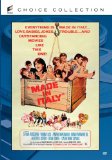| Reviews & Columns |
|
Reviews DVD TV on DVD Blu-ray 4K UHD International DVDs In Theaters Reviews by Studio Video Games Features Collector Series DVDs Easter Egg Database Interviews DVD Talk Radio Feature Articles Columns Anime Talk DVD Savant Horror DVDs The M.O.D. Squad Art House HD Talk Silent DVD
|
DVD Talk Forum |
|
|
| Resources |
|
DVD Price Search Customer Service #'s RCE Info Links |
|
Columns
|
|
|
Made in Italy (Sony Choice Collection)
An oftentimes funny, sometimes sad--and at times perplexing--kaleidoscope. Sony Pictures' Choice Collection line of hard-to-find library and cult titles has done exactly what's it's supposed to do, releasing rare import, Made In Italy, the 1965 Commedia all'italiana Italian-French co-production (released here in the States by Columbia Pictures in 1967), co-written and directed by Nanni Loy, and featuring a big, big cast of Italian (and a few French) stars, including Anna Magnani, Nino Manfredi, Alberto Sordi, Sylva Koscina, Virna Lisi, Catherine Spaak, and Jean Sorel, just to name a few. A compilation of some 30 loosely-grouped, unconnected vignettes, Made In Italy strives to give a serio-comic panorama of the Italian people, in all their folly and glory--and everything else inbetween--with, for the most part, entertaining results. No extras here for this English-dubbed, anamorphically-enhanced Techniscope transfer.
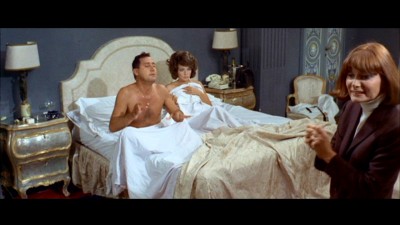
Just to be fair, I'm certainly no expert in the Commedia all'italiana "genre." Apparently it's a loose term anyway, according to more knowledgeable writers, with a central distinguishing feature of the genre being an emphasis on delivering an equally sad, resigned tone along with the laughs, while satirizing and sympathizing with its Italian characters. My exposure to the genre is limited to just a handful of titles that are readily known here in the States, such as Big Deal on Madonna Street, Divorce, Italian Style, Boccaccio '70, Yesterday, Today and Tomorrow, The Witches, The Seduction of Mimi, and Swept Away. So I can't really put Made In Italy into any kind of context because my knowledge of its genre is admittedly sparse (funny how spaghetti Westerns, giallos, and dramas from the likes of giants like Fellini and Antonioni are so much more accessible to American viewers, while classic, mainstream Italian comedies like Made In Italy--just as popular with Italian viewers, and perhaps more representative of the workaday output of the Italian cinema--are relatively scarce). All I can do is judge Made In Italy as I took it, outside of any baseline (if you're really into Italian movies, please excuse me, too, if I inadvertently mix-up some of the names of the Italian actors not as well known here in the States; this DVD of the English-dubbed Made In Italy doesn't provide any subtitles--an excellent way for reviewers to match up character names with the actors--while outside references for the movie are a bit sketchy).
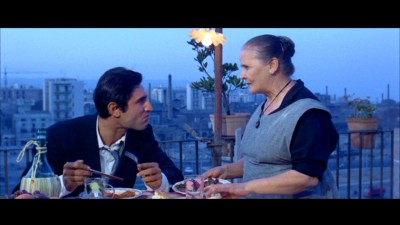
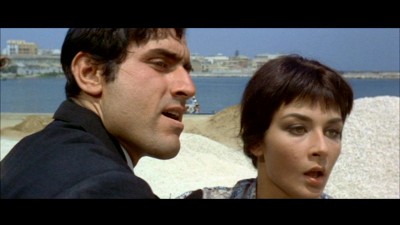
Reading that back, that's a fair amount of reticence for the beginning of a review, isn't it? Actually, there really shouldn't be any cause for that kind of hesitation when writing about Made In Italy. Its aims seem straightforward enough and, outside of the obvious challenges in the ever-changing cultural context that may make some of its vignettes close-to-indecipherable for an American viewing it in 1967 (let alone 2013), its results are for the most part quite accessible. And rather fun. Co-written by director Nanni Loy (the superlative docudrama, The Four Days of Naples), Ruggero Maccari (The Magnificent Cuckold, the original Scent of a Woman), and his frequent collaborator, Ettore Scola, Made In Italy's construction, if you can call it that, is tied together by a sequence on a jetliner, heading (we later learn) to Stockholm, carrying four Italian laborers (Giampiero Albertini, Aldo Bufi Landi, Adelmo Di Fraia, Renato Terra) emigrating to Sweden. As the men interact with the passengers and stews, title cards bearing five chapter headings--"Habits and Customs," "The Job," "Women," "Citizen, State and The Church," and "The Family"--are superimposed at various intervals, as we cut to loosely-aligned vignettes contained within those broad chapters.

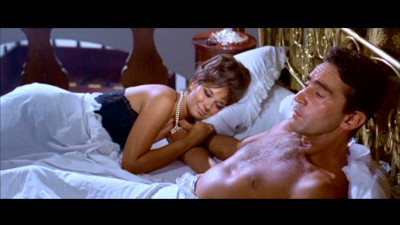
And that's about it for Made In Italy. There's no true narrative to the movie, just a medley of impressions, observations, satires, spoofs, and glimpses--some depressing and most amusing--of Italians at work and at play in 1965. The individual tone of the vignettes vary greatly, from almost documentary in feel (the woman farmer silently breastfeeding her baby), to the sitcomy look and sound of Alberto Sordi's cheating husband segment. The intellectual and emotional weight behind these vignettes differs quite dramatically, too, ranging from a very short scene with two men walking with their girlfriends/wives as they sneak peeks at the rear ends of each other's girl, to the funny-then-rather devastating sequence where Anna Magnanni tries to cross a busy street with her unruly family in tow. Some of the vignettes' points or meanings--if indeed they really had specific ones in mind in the first place--can be quite obscure, whether because of cultural or time-span differences (the solitary man in the train compartment, lying to other passengers that he's saving seats, so he can then lock the door and stretch out on the floor), while some are open to interpretation (the nun window shopping), while still others are easy and straightforward (Nino Manfredi's fight with Italian bureaucracy).

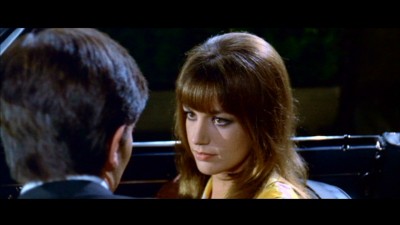
With this kind of tonal variety, one could make the case that the only true unifying factor here is the cinematography of famed lensman Ennio Guarnieri (Hitler: The Last Ten Days, Swept Away, Wifemistress, Ginger and Fred, and TV's Ellis Island and A.D.), who unfailingly presents one beautiful widescreen frame after another as director Loy bounces from Rome to Sicily to Naples to Turin to Florence, giving us stunning views of the Italian countryside and cityscapes. Certainly there's no argument, unfortunately, over Made In Italy's biggest drawback: its English dub. Screechy and annoying almost from the start, the dub here can be confusing (are some of the characters supposed to be non-Italian tourists...because the accents are deliberately bizarre), while often the brash, overemphatic nature of the voice actors' deliveries contrasts (sometimes grotesquely) with the performers' turns. Not helping, either, are the lack of subtitles (I'm sure they weren't there in 1967, either); too bad I missed some jokes because the Italian written out in a few scenes wasn't translated.
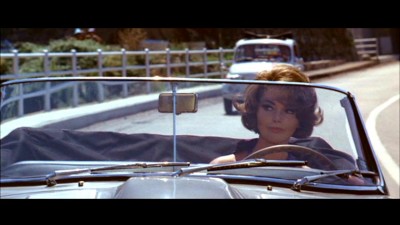
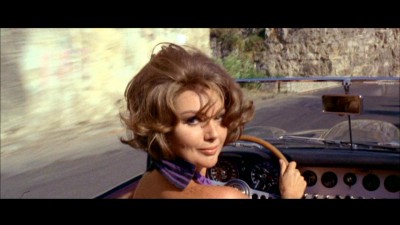
Just from a novelty standpoint alone, Made In Italy is always interesting; however, a few of the vignettes do underwhelm. The rich couples slumming it at a rough restaurant is pretty obvious, as is the funeral where everyone wails about the deceased...as they enthusiastically stuff their faces. I'm afraid I didn't understand at all the significance of the dock worker getting a cigarette lowered down to him from a ship (the previously mentioned nun window shopping vignette was too vague to make much impact, either). Handsome Jean Sorel chasing after luscious Sylva Koscina seemed promising at first...until the silly, juvenile resolution (he just wanted to drive her Jag...he must be insane). Fortunately, those are only a handful among the winners here. Lando Buzzanca is quite funny as a horny suitor of hot Jolanda Modio; all he cares about is if she's still a virgin...so when his police officer brother Aldo Giuffre starts ticking off her increasingly heinous criminal record, Buzzanca is continuously, hilariously relieved. Walter Chiari has one of the best entries here as a hot-blooded pursuer of beautiful--and married--Lea Massari, who hustles her out of his apartment as quickly as he talked her into bed (true movie fans will love the reason he does such an insane thing). On the flip side of fun, Nino Castelnuovo doesn't have a word of dialogue, but he's wonderfully numb as a factory worker robotically going through his day-after-day-after-day grind--a true, and thoroughly depressing, vignette.
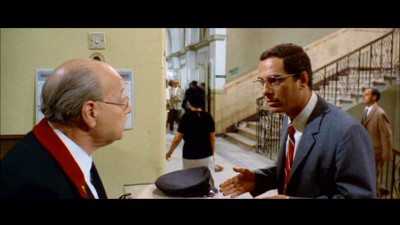

Any chance to see the knee-weakening Virna Lisi in widescreen closeup is fine with me, and she does well here as a "kept woman" who mouths platitudes about her "sacrifices." Lovely French actress Catherine Spaak is heartbreaking as a name-dropping girl who isn't what she appears to be (an upsetting vignette, to be sure). Italian comedy legend Nino Manfredi is perfect as a befuddled Modern Everyman caught in the wheels of the ridiculously complicated Italian bureaucracy, while another comedy icon, Alberto Sordi, scores big laughs with his indignant act when he's caught cheating on his wife, Rossella Falk, with sexy Claudie Lange. Anna Magnani makes the strongest impression in the movie with her seemingly simple, amusing vignette: she has to get her whining, hot, sweaty family across a deadly, car-streaking Roman street for some ice cream. It's a simple premise, beautifully built by director Loy, with Magnani getting big laughs when she starts smacking approaching cars and whining kids with equal disgust. Of course, once they make it across and get to the diner, SPOILER ALERT, they're out of ice cream (except pistachio, which gives her kids diarrhea), so Magnani sits down, her face falling, and her eyes tearing up, and you immediately feel the absolute frustration and disappointment and resignation she's experiencing yet again in her life...and it's got nothing to do with ice cream. A frankly brilliant change of tone, and it's all down to the remarkable Magnani (critics always said her looks were "unconventional," but I find her sexy as hell). And finally, the closing vignette, where the Italian workers land in Stockholm, stunned into silence by the frigid, frozen landscape awaiting them, is beautifully tempoed as the workers begin to recognize the beauty around them. Once the men enter a diner filled with solemn, silent Swedes, Loy's camera stays outside and pulls back, as we hear the joyful Italians playfully raising the spirits of everyone inside, even getting some of the silent Swedes to laugh. It's a wonderful moment, a crystal-clear distillation of Loy's belief that not even the arctic expanses of chilly Sweden can freeze the ebullient spirit of the life-loving Italians who always bring a little bit of sunny, good-humored Italy with them wherever they go.


The DVD:
The Video:
The anamorphically-enhanced, 2.35:1 widescreen transfer for Made In Italy looks good. Grain is a factor, as expected, but the image is relatively sharp and colors are okay, if smeary a few times. Looks good on a big monitor.
The Audio:
The Dolby Digital English mono audio track is fine, with slight hiss and a strong re-recording level. No subtitles or closed-captions here (needed those...).
The Extras:
No extras for Made In Italy.
Final Thoughts:
Unusual, and fun. Commedia all'italiana Made In Italy gives us a kaleidoscopic panorama of Italians at work and play, with many more laughs than tears. For all I know, modern Italians may look at a movie like this the way we look at something like Peyton Place, but the funny and sad truths revealed here, many obvious, some deep, are timeless. I'm recommending Made In Italy.
Paul Mavis is an internationally published movie and television historian, a member of the Online Film Critics Society, and the author of The Espionage Filmography.


|
| Popular Reviews |
| Sponsored Links |
|
|
| Sponsored Links |
|
|
| Release List | Reviews | Shop | Newsletter | Forum | DVD Giveaways | Blu-Ray | Advertise |
|
Copyright 2024 DVDTalk.com All Rights Reserved. Legal Info, Privacy Policy, Terms of Use,
Manage Preferences,
Your Privacy Choices | |||||||









